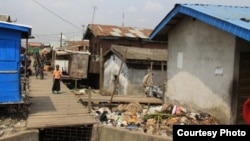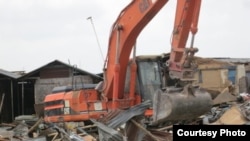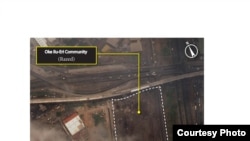ABUJA, NIGERIA —
Amnesty International says satellite imagery shows 9,000 people have been forcibly evicted from their homes or businesses in a Lagos, Nigeria slum this year. And while residents told the organization that they were forced to leave at gunpoint, the government says the area was a trash dump.
It is an old story, and it is not just in Nigeria. Poor people build makeshift homes on empty land. When the land becomes valuable they are forced out. Amnesty International says in February of this year, an area known Badia East in Lagos, Nigeria’s biggest city, was demolished with no warning to residents.
The organization's Meghna Abraham said armed officers accompanied construction crews to the demolition, and they told people “If you love your life, move out.” Many of those people, she said, still are homeless and jobless.
“A lot of them had these small businesses and were self-sufficient in the past, but now have lost their sources of income in addition to their homes so are completely dependent on families or friends to give them even basic necessities - clothing, food,” said Abraham.
Families, she added, also remain separated by the destruction of the neighborhood. “A lot of people commented on the fact that they have had to send their children away because they have nowhere to keep them while they're homeless. The consequences have been very, very devastating for people.”
She said some government officials told Amnesty the area was a rubbish dump, while others reported there were evictions when the land was cleared to make way for what will be new, mixed-income housing.
Abraham says this is part of a larger pattern in Lagos State, citing forced evictions in 2012 in a fishing village called Mkoko on Lagos Lagoon. Both Badia East and Mkoko residents are fighting in court to keep their homes.
But not everyone in Lagos state thinks this pattern is a bad thing. The state government led by Governor Babtunde Fashola has been widely praised for development projects that directly impact the people, like building a railway and fixing roads.
As he waits for a city bus, a marketing executive said tearing down slums, which he calls ‘shantytowns,’ reduces crime and makes Lagos more appealing for tourists. “I think it is a welcome development. I think it is a good idea for the government of the state to destroy shanties and try to develop a new site.”
Amnesty International says Nigeria lacks a legal framework to protect people from forced evictions, which make the evicted residents poorer and more vulnerable. But development officials say destroying slums and replacing them with planned communities is one way they hope to lift Nigeria out of poverty.
It is an old story, and it is not just in Nigeria. Poor people build makeshift homes on empty land. When the land becomes valuable they are forced out. Amnesty International says in February of this year, an area known Badia East in Lagos, Nigeria’s biggest city, was demolished with no warning to residents.
The organization's Meghna Abraham said armed officers accompanied construction crews to the demolition, and they told people “If you love your life, move out.” Many of those people, she said, still are homeless and jobless.
“A lot of them had these small businesses and were self-sufficient in the past, but now have lost their sources of income in addition to their homes so are completely dependent on families or friends to give them even basic necessities - clothing, food,” said Abraham.
Families, she added, also remain separated by the destruction of the neighborhood. “A lot of people commented on the fact that they have had to send their children away because they have nowhere to keep them while they're homeless. The consequences have been very, very devastating for people.”
She said some government officials told Amnesty the area was a rubbish dump, while others reported there were evictions when the land was cleared to make way for what will be new, mixed-income housing.
Abraham says this is part of a larger pattern in Lagos State, citing forced evictions in 2012 in a fishing village called Mkoko on Lagos Lagoon. Both Badia East and Mkoko residents are fighting in court to keep their homes.
But not everyone in Lagos state thinks this pattern is a bad thing. The state government led by Governor Babtunde Fashola has been widely praised for development projects that directly impact the people, like building a railway and fixing roads.
As he waits for a city bus, a marketing executive said tearing down slums, which he calls ‘shantytowns,’ reduces crime and makes Lagos more appealing for tourists. “I think it is a welcome development. I think it is a good idea for the government of the state to destroy shanties and try to develop a new site.”
Amnesty International says Nigeria lacks a legal framework to protect people from forced evictions, which make the evicted residents poorer and more vulnerable. But development officials say destroying slums and replacing them with planned communities is one way they hope to lift Nigeria out of poverty.







